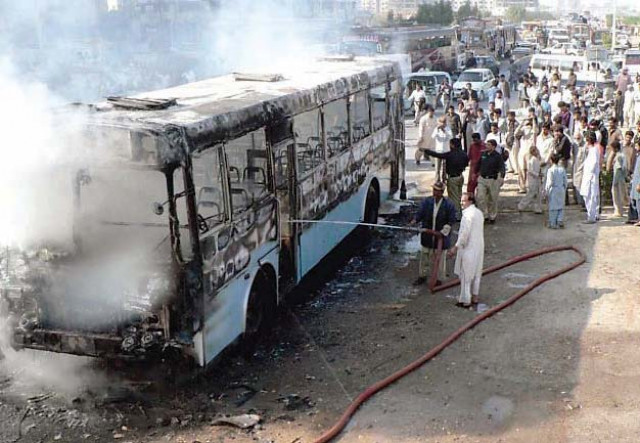After professor’s murder, a debate on student politics at universities
Everyone agreed on the ills, but differed on the solutions.

The problem of campus violence, administrative corruption and the insecurity of teachers were discussed at a conference organised by Strengthening Participatory Organisation.
While there was a general consensus among the students, teachers and political workers over the removal of the current vice chancellor of Sindh University (SU), Dr Nazir A Mughal, the speakers, however, differed on the approaches to address other structural problems.
A professor of international relations, Inam Shaikh, blamed both the students and teachers. He said that he could name many teachers who had not been taking classes for 10 to 15 years but were still drawing their salaries and enjoying all the perks. “Some of them have even been made heads of departments.”
Shaikh compared the present state of student politics with that in the times of the martial law regimes of Ayub Khan, Yahya Khan and Ziaul Haq and said that it had changed from being sublime to ridiculous.
Arfana Mallah of the Sindh University Teachers Association (SUTA) stressed that teaching was not possible without a peaceful environment on campus.
Since the murder of Prof. Bashir Channar on January 3, the SUTA has been on a boycott. Mallah said that the teachers will not teach till a judicial commission is set up to investigate the murder, the vice chancellor resigned, and private security were brought on campus instead of the Rangers and policemen. Student criminals also need to be expelled.
The pro-vice chancellor of SU’s Mirpurkhas campus was also present. Prof. Imdad Ismaili said that the killers should be arrested and hanged on the university premises. He requested the teachers to resume taking classes and assured them that their demands would be accepted.
Dhani Bux Solangi, a student leader of the Jeay Sindh Qaumi Mahaz (JSQM), said that student unions provided fresh blood to political parties which is why he demanded that the ban be lifted.
Mir Alam Mari, a student leader of another faction of JSQM, criticised the government, teachers, civil society and intellectuals for having “double standards” about student politics. “Why are they all always hell-bent on finding fault with us?” he asked. He didn’t see the removal of the vice chancellor as an immediate solution, saying that all public sector universities were governed by inept heads. Mari said that they should refrain from imposing a “military psychology” which looked down on student politics.
The president of the Awami Jamhoori Party, Abrar Qazi, strongly advised banning student unions. He said that student politics had only resulted in a deterioration of the academic environment and peace on campus. However, he admitted that dishonest teachers contributed to the problem. But, he said, administrative corruption and criminal students were worse.
The chairman of the Sindh Tarraqi Pasand Party (STPP), Dr Qadir Magsi, alleged that Governor Dr Ishratul Ebad promoted the agenda of a particular political party in the educational institutions of the province.
“Khyber-Pakhtunkhwa and the Punjab have already devolved the education authority to the provincial governments according to the 18th Amendment,” said Magsi. “Then why is the Sindh government indulging the wishes of its allies at the cost of Sindhis?” He also called for complete freedom of politics at university campuses.
Published in The Express Tribune, January 17th, 2012.



















COMMENTS
Comments are moderated and generally will be posted if they are on-topic and not abusive.
For more information, please see our Comments FAQ